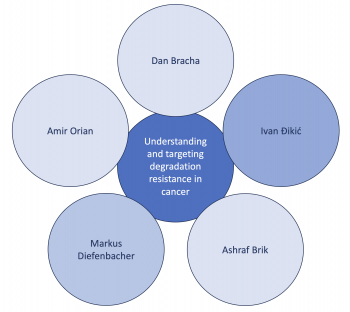11 Jan 2024 - Targeting resistant cancers with new therapeutics
A collaborative research project between scientists from Technion - the Israel Institute of Technology in Haifa, Goethe University Frankfurt and Helmholtz Center Munich/Ludwig Maximilian University Munich on “Understanding and Targeting Degradation-resistant Cancers” is funded with 1.6 million € as part of the German-Israeli Project Cooperation (DIP). DIP was inaugurated in 1997 by the German Federal Ministry for Education and Research (BMBF) to strengthen excellence in German-Israeli research cooperation. The Deutsche Forschungsgemeinschaft (DFG, German Research Foundation) has taken over and continues the program while BMBF continues to provide funding for the five-year projects.
The project will investigate the increased stabilization of short-lived degradable oncoproteins, which is a hallmark of aggressive and therapy-resistant cancers present in a significant group of patients. Unveiling the molecular and cellular basis of oncoprotein stabilization pathways and developing therapeutics targeting these cancer entities (termed “degradation resistant cancers”), is an urgent and unmet clinical need.
Three project partners from Technion, Ashraf Brik, Amir Orian and Dan Bracha and on the German side, IBC2 Director Ivan Đikić and LMU Professor and Helmholtz Center Munich Group Leader Markus E. Diefenbacher will bring together synergistic expertise to discover fundamental mechanisms that drive oncoprotein stabilization and tumorigenesis. High-end chemical and biochemical methods in the field of targeted protein degradation, combined with fly and mouse genetics and connected to clinical samples and data will be utilized to discover novel layers of protein regulation, including enzymes and mechanisms that are fundamental to the tumorigenesis of degradation resistant tumours. In the implementation of the project, the Frankfurt Competence Center for Emerging Therapeutics (FCET), which was recently founded as part of the Goethe Center for (High) Technology (Go4Tec), plays a key role as an innovation hub providing access to high-end instruments and technologies. Gaining a comprehensive and fundamental understanding of the underlying molecular mechanisms of degradation resistant tumors will enable the group of scientists to develop novel inhibitors and degraders (PROTACs) using their state-of-the-art screening platforms of small molecules, which will have direct implications for future development of ubiquitin-related therapeutics.

